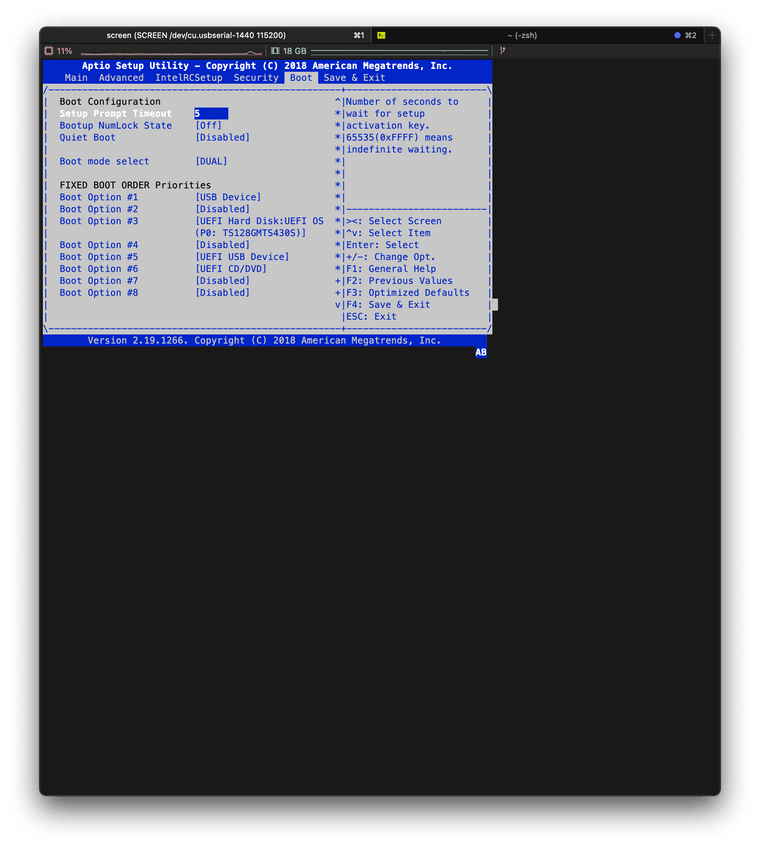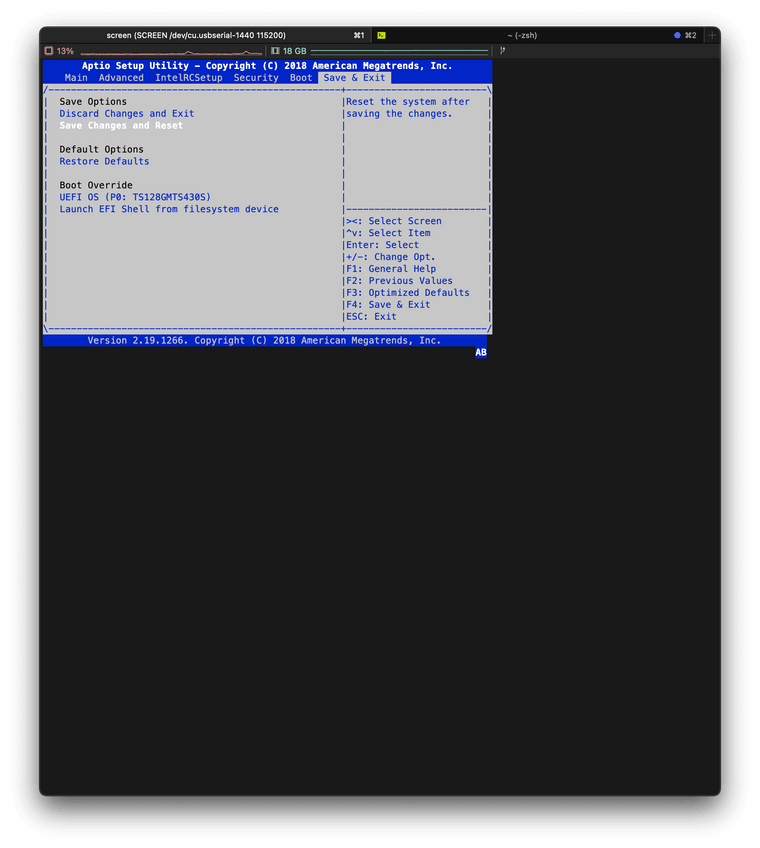SG-5100 takes over 20 minutes to boot after eMMC failure
-
@rcoleman-netgate said in SG-5100 takes over 20 minutes to boot after eMMC failure:
@hayescompatible Try taking the CD/DVD out of the boot sequence and move the UEFI above the MBR options.
Tried that, same result (cold boot OK, warm boot locks up):

Save & Exit:

When I cold boot, the console clears and I see POST codes flash on the console, like A2, 99, B2 and maybe B4. On a warm boot, I see none of these (console doesn't even clear).
-
@hayescompatible said in SG-5100 takes over 20 minutes to boot after eMMC failure:
That was my keyboard.
Why do you have a keyboard connected directly? Is it always connected?
If so that differs from almost all other 5100 installs.
Steve
-
@stephenw10 said in SG-5100 takes over 20 minutes to boot after eMMC failure:
@hayescompatible said in SG-5100 takes over 20 minutes to boot after eMMC failure:
That was my keyboard.
Why do you have a keyboard connected directly? Is it always connected?
If so that differs from almost all other 5100 installs.
Steve
?
It was my own keyboard. I only had it connected because it’s easier than using my laptop keyboard to get into the BIOS settings on boot. In any event, this boot problem occurs whether or not a keyboard or anything else is connected to the console or USB ports.
-
 H hayescompatible referenced this topic on
H hayescompatible referenced this topic on
-
@hayescompatible I am experiencing the same on my 5100 box. I also replaced my failed eMMC with an SSD. Did you find a solution to the problem?
-
@haraldinho said in SG-5100 takes over 20 minutes to boot after eMMC failure:
@hayescompatible I am experiencing the same on my 5100 box. I also replaced my failed eMMC with an SSD. Did you find a solution to the problem?
My "solution" is to halt the system, unplug it and then plug it back in whenever I need to reboot. This seems to be the only way to prevent the system from locking up. Cold boot is fine, warm boot locks up the 5100. I've played with a bunch of different BIOS settings but nothing seems to help, even with "optimized defaults".
The thread's gone quiet so I can only assume since the 5100 is no longer sold that I'm SOL on this. I just wish I had known about the limitations of the eMMC beforehand so I could have installed an SSD sooner to avoid this.
-
Mmm, unfortunately I'm not aware of any solution to that issue. It's possible it could be solved by a future BIOS update but I've not seen anything there either.
-
@hayescompatible are you able to provide a link to the m.2 SATA you purchased? I’m going to learn from your sad misfortune and install m.2s in my 5100s before I meet a similar fate. It really sucks that something like this can basically ruin perfectly good hardware.
-
@gabacho4 said in SG-5100 takes over 20 minutes to boot after eMMC failure:
@hayescompatible are you able to provide a link to the m.2 SATA you purchased? I’m going to learn from your sad misfortune and install m.2s in my 5100s before I meet a similar fate. It really sucks that something like this can basically ruin perfectly good hardware.
Here's what I got:
https://www.cendirect.com/main_en/tech-specs-TS128GMTS430S-JO357QQB.html
Link to the product page on Transcend's site:
https://ca.transcend-info.com/product/internal-ssd/mts430s
I got the 128 GB drive since it's the smallest size they offer.
Had I known how prone the eMMC is to failure (I don't log much to the pfSense box, it's just the default logs and pfBlocker updates that likely do most of the writing to the drive), I would have installed this from the start a couple of years ago when I bought the 5100. I only found out over the course of troubleshooting the boot slowdown post-eMMC failure that there is a utility that can provide the health status of the eMMC:
https://docs.netgate.com/pfsense/en/latest/troubleshooting/disk-lifetime.html#emmc
Alas, too late for me.
-
@hayescompatible appreciate the info on the SSD and the MMC monitoring. I’ll look into that tomorrow as I cannot afford for these to crap out, especially as one is a vpn endpoint 7000 miles away.
-
@hayescompatible just to be sure, the ssd that the 5100 takes is indeed a sata III ( with 3 connection points versus 2)?
-
Well for the very distant 5100, my results are:
eMMC Life Time Estimation A [EXT_CSD_DEVICE_LIFE_TIME_EST_TYP_A]: 0x0b eMMC Life Time Estimation B [EXT_CSD_DEVICE_LIFE_TIME_EST_TYP_B]: 0x0b eMMC Pre EOL information [EXT_CSD_PRE_EOL_INFO]: 0x01For my local box, it gives me:
eMMC Life Time Estimation A [EXT_CSD_DEVICE_LIFE_TIME_EST_TYP_A]: 0x0b eMMC Life Time Estimation B [EXT_CSD_DEVICE_LIFE_TIME_EST_TYP_B]: 0x0b eMMC Pre EOL information [EXT_CSD_PRE_EOL_INFO]: 0x01How worried should I be? Seems like the drive is normal but the A and B values are at or above 100%
-
Mmm, that's not great, is that the first time you've checked the values?
-
@stephenw10 <<gulp>> Yup. Had no idea this was a thing to be honest. To date, I have never had a hard drive fail in any of my computer devices, including an 8 bay NAS that has been running Western Digital Red drives since like 2013. I've already ordered the m.2 but now I am worried about experiencing the same delayed restart shenanigans.
-
@gabacho4 said in SG-5100 takes over 20 minutes to boot after eMMC failure:
@hayescompatible just to be sure, the ssd that the 5100 takes is indeed a sata III ( with 3 connection points versus 2)?
It's a SATA drive - see M.2 SATA Installation. I don't remember what the connector looked like because it's been a while since I installed it, but looks like it's a B+M key. (Check the model number of the drive I linked to earlier—you'll see B+M keying.)
-
I purchased the Transcend 430S M.2 512 GB SATA III 3D NAND. Works perfectly except the boot issue. I am working with Netgate support to see if I can get the issue resolved. Will report back if I have a solution.
-
On advice of Netgate Support I did a clean reinstall with UFS (was on ZFS). The problem remains exactly the same. I feel the problem is the eMMC memory that is toast but still is getting poked by the 5100. I expected it to be disabled after installing my M.2 SSD, but it is clearly not.
Loads of these error message in the logs:
mmcsd0: Error indicated: 1 Timeout mmcsd0: Error indicated: 1 Timeout sdhci_pci0-slot0: Controller timeout sdhci_pci0-slot0: ============== REGISTER DUMP ============== sdhci_pci0-slot0: Sys addr: 0x05840000 | Version: 0x00001002 sdhci_pci0-slot0: Blk size: 0x00005200 | Blk cnt: 0x00000010 sdhci_pci0-slot0: Argument: 0x00000010 | Trn mode: 0x00000033 sdhci_pci0-slot0: Present: 0x1fff0206 | Host ctl: 0x00000025 sdhci_pci0-slot0: Power: 0x0000000b | Blk gap: 0x00000080 sdhci_pci0-slot0: Wake-up: 0x00000000 | Clock: 0x00000207 sdhci_pci0-slot0: Timeout: 0x0000000d | Int stat: 0x00000001 sdhci_pci0-slot0: Int enab: 0x01ff003b | Sig enab: 0x01ff003a sdhci_pci0-slot0: AC12 err: 0x00000000 | Host ctl2:0x0000000c sdhci_pci0-slot0: Caps: 0x546ec8b2 | Caps2: 0x80000007 sdhci_pci0-slot0: Max curr: 0x00000000 | ADMA err: 0x00000000 sdhci_pci0-slot0: ADMA addr:0x00000000 | Slot int: 0x00000000 sdhci_pci0-slot0: =========================================== mmcsd0: Error indicated: 1 Timeout mmcsd0: Error indicated: 1 Timeout sdhci_pci0-slot0: Controller timeout sdhci_pci0-slot0: ============== REGISTER DUMP ============== sdhci_pci0-slot0: Sys addr: 0x05840000 | Version: 0x00001002 sdhci_pci0-slot0: Blk size: 0x00005200 | Blk cnt: 0x00000010 sdhci_pci0-slot0: Argument: 0x00000200 | Trn mode: 0x00000033 sdhci_pci0-slot0: Present: 0x1fff0206 | Host ctl: 0x00000025 sdhci_pci0-slot0: Power: 0x0000000b | Blk gap: 0x00000080 sdhci_pci0-slot0: Wake-up: 0x00000000 | Clock: 0x00000207 sdhci_pci0-slot0: Timeout: 0x0000000d | Int stat: 0x00000001 sdhci_pci0-slot0: Int enab: 0x01ff003b | Sig enab: 0x01ff003a sdhci_pci0-slot0: AC12 err: 0x00000000 | Host ctl2:0x0000000c sdhci_pci0-slot0: Caps: 0x546ec8b2 | Caps2: 0x80000007 sdhci_pci0-slot0: Max curr: 0x00000000 | ADMA err: 0x00000000 sdhci_pci0-slot0: ADMA addr:0x00000000 | Slot int: 0x00000000 sdhci_pci0-slot0: =========================================== mmcsd0: Error indicated: 1 Timeout mmcsd0: Error indicated: 1 Timeout mmcsd0: Error indicated: 1 Timeout mmcsd0: Error indicated: 1 Timeout mmcsd0: Error indicated: 1 TimeoutNow I am surfing the internet to see if somebody succeeded in actually getting this memory disabled.
Harald
-
@haraldinho very unfortunate to hear indeed. So far my eMMC isn’t giving me any issues that I know of but, based on the data, it looks like I’m due to have them.l eventually. I have 2 M.2 ssd on their way to this and the remote location. Crazy that what was a 600 dollar device can be crippled by something like this. Not being able to restart a device and having to rely on someone to physically power it back on is nuts. Gonna have to start considering my options if a real fix cannot be found.
-
@haraldinho You can disable it completely in pfSense and prevent those errors.
Create the file /boot/loader.conf.local and add to it:hint.mmcsd.0.disabled="1"But that doesn't help with the slow boot in the BIOS.
Steve
-
Since these are Lanner devices, have they been contacted regarding BIOS updates or anything? Seems they might be the last real hope since it’s their hardware, maybe?
-
Yes, we are working with them on a BIOS update now. It isn't to address this specifically but hopefully could do so.
Steve